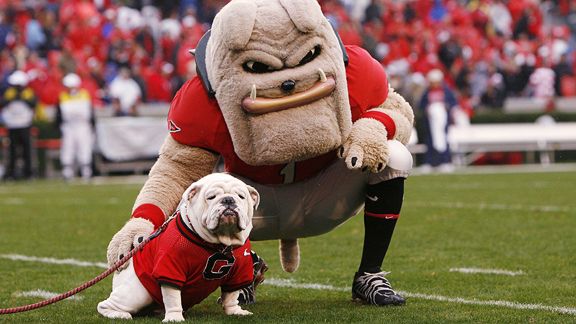Univ. of Georgia Stymies Open-Records Law in Pursuit of NCAA Titles
School also forces students to pay millions in athletic fees to cover programs.

The University of Georgia is a flagship state university that is arguably more into its sports programs (especially football) than its academics. As a member of the powerful SEC NCAA conference, the Bulldogs are perpetual high-performance losers when it comes to college pigskin, routinely cracking the Top 10 but oh-so-rarely actually winning a conference title, let alone a national crown. When it comes to academics, Georgia fails to crack the top 50 of U.S. News' ranking of "national universities."
Given the school's athletic ambitions, it should come as no surprise that the just signed a law "signed into law a bill that allows public college and university athletic departments to avoid responding to open-records requests for up to 90 business days." The bill was lobbied for by the University of Georgia's football coach, Kirby Smart, and has been nicknamed "Kirby's Law."
From Inside Higher Ed:
"I'm from Georgia," said Frank LoMonte, executive director of the Student Press Law Center. "I know how important football is there. But the whole process is so troubling. It's really alarming. Now that Georgia has established 90 days as the target, you can envision other states racing them to the bottom."
Sponsors of the bill said it came in response to institutions being flooded with open-records requests designed to elicit information about college football recruiting practices, but the language of the amendment goes much further. Colleges can wait 90 days to respond to any athletics-related open-records request, including how much athletic departments are spending on travel for recruiting or on building new athletics facilities.
Other teams in the SEC are required to respond to such requests in between three days and 15 days. The three months' delay built into "Kirby's Law" effectively covers just about any sports season.
Coach Smart is pulling down $3.75 million in base salary and has "has already spent more than $500,000 chartering airplanes and helicopters to recruit players and hire staff." In most states, the highest-paid public-sector employee is a college football or basketball coach. USA Today, which maintains a database of how much public colleges subsidize sports programs (private schools refuse to participate), finds that undergrads at University of Georgia are charged $3.2 million a year in student fees to subsidize sports there.
So we can add one more cause for ongoing spikes in college costs: college sports.
As a big fan of college sports, especially football and men's hoops (the only two sports that generate major-league revenue), I've noted repeatedly that most public Division I schools spend millions and millions of tax dollars and mandatory student fees to subsidize mostly mediocre sports "traditions." And let's be clear: Even the NCAA admits that good sports programs do not increase the quantity and quality of incoming students (the so-called "Flutie Effect"); neither do sports increase non-athletic giving to institutions.
According to USA Today's chart, my undergrad alma mater, Rutgers, kicks in fully half of its athletic department budget, to the tune of nearly $50 million a year. Colleges whose academic reputations are way less than stellar—such as Virginia schools James Madison and Old Dominion, Eastern Michigan, and Texas State—all spend north of $20 million a year on college sports. I'm sure that many private schools do the same and, to the extent that such out-of-student-pockets spending is enabled by tax-supported loans and grants, that's an outrage.
At least when certain cities and states stupidly subsidize the hell out of pro sports franchises, those of us living elsewhere don't have to pony up dough to cover teams and activities we don't give a shit about (thank god, we don't all live in Hartford, Connecticut, right?). But when it comes to college sports, it turns out that basically all of us are on the hook, mostly because our state legislatures have decided that part of the "college experience" is to heavily bankroll sports teams that have absolutely no connection to the at-least-defensible mission of providing state-supported higher education.
Related: College athletes do have a market value—from which they are systematically alienated via awful collusion between schools and the NCAA. Watch "How much is a college athlete worth?"


Show Comments (20)